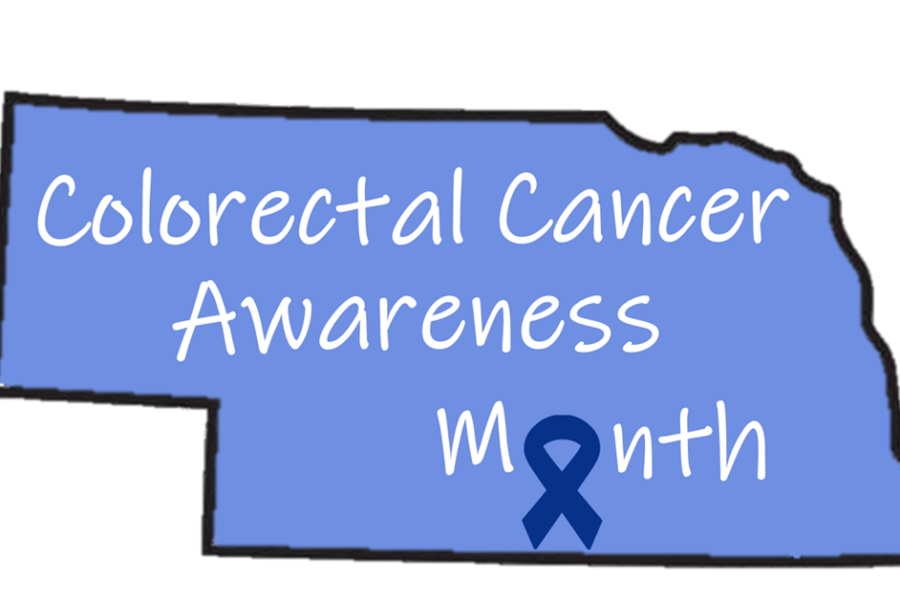In March, we wear blue.
We wear blue for the 153,020 people who will be diagnosed with colon cancer this year in the United States. We wear blue for the 1 in 23 men and 1 in 25 women who will be diagnosed with colon cancer in their lifetime. We wear blue because while Stage I colon cancer has a 91% survival rate, only 38% of colon cancer is found at this early stage. We wear blue because colon cancer diagnoses are rising in individuals under the age of 50. We wear blue because colon cancer diagnoses are 20% higher in African Americans. We wear blue because only 27.5% of Nebraskans are up to date on their colon cancer screenings. We wear blue because March is Colorectal Cancer Awareness Month.
Colorectal Cancer Awareness month was first observed in March 2000. Since then, it has become an opportunity to spread awareness, fundraise, and honor those with colon cancer. The Nebraska Cancer Coalition launched “45 Is The New 50” to highlight the new (2018) colon cancer screening guidelines that begin at age 45 instead of 50.
In honor of colorectal cancer awareness month, let’s take a few moments to learn more about colon cancer and how you can get involved!
When should I start screening?
Individuals should start regular colon cancer screening at age 45. Since 2020, diagnoses under the age of 50 have gone up by 2.2% each year! Check out the “Never Too Young” through the Colon Cancer Alliance to learn more about young-onset colon cancer.
If you are at high risk for colon cancer, your healthcare provider may recommend starting colon cancer screening before age 45. Individuals may be considered high risk if they have:
- A family or personal history of colorectal cancer or certain types of colon polyps (growths).
- A personal history of inflammatory bowel disease (ulcerative colitis or Crohn’s disease).
- A known family history of a hereditary colorectal cancer syndrome such as familial adenomatous polyposis (FAP) or Lynch syndrome.
- A personal history of radiation to the abdomen (belly) or pelvic area to treat a prior cancer.
What types of colon cancer screenings are available for me?
There are two main groups of colon cancer screenings – stool-based tests and visual/structural exams like a colonoscopy. The stool-based tests require screening more frequently (every 1 to 3 years) and are not recommended for those at high risk for colon cancer. Visual exams are typically performed every 5 to 10 years.
To learn more about the different screening options for colon cancer, check out these sites:
What are the symptoms of colon cancer?
- A change in bowel habits, such as diarrhea, constipation, or narrowing of stool, that lasts for more than a few days.
- Feeling that you need to have a bowel movement that’s not fixed by having one.
- Blood in the stool, which might make the stool look dark brown or black.
- Cramping or abdominal (belly) pain.
- Feeling weak and tired.
- Unplanned weight loss.
Use this symptom tracker through the Colorectal Cancer Alliance to monitor any symptoms and share them with your doctor.
What causes colon cancer?
Most colon cancer diagnoses are sporadic, meaning they occur by random chance. Things like age, weight, physical activity, smoking, alcohol use, and diets high in red meat can increase a person’s risk of developing colon cancer. Other factors like personal health history and family history also affect someone’s risk; however, with cancer, it is often a combination of these risk factors that explains why someone develops colon cancer, not just one thing.
Some individuals (5% of individuals with colon cancer) carry a genetic (DNA) change in all the cells in their body that increases their risk of developing colon cancer. There may often be a history of young-onset colon cancer, plus other cancers like uterine and stomach cancer in their family. Individuals may have had colon polyps (growths) starting at a young age and may have had many (>10) removed in their lifetime. Making sure your doctor has an updated and complete family history is a great place to start if you are concerned about a hereditary cancer syndrome. Additionally, you can locate a genetic counselor near you who can review your family history and discuss if genetic testing is indicated.
Other support
We know that colon cancer screening is our best tool in fighting colon cancer; however, these screenings are not always accessible to patients. The Colon Cancer Alliance provides information on how patients can access funding in their state to help cover the cost associated with colon cancer screenings.
Now that you have had an opportunity to learn more about colon cancer, will you join us in wearing blue this March?
